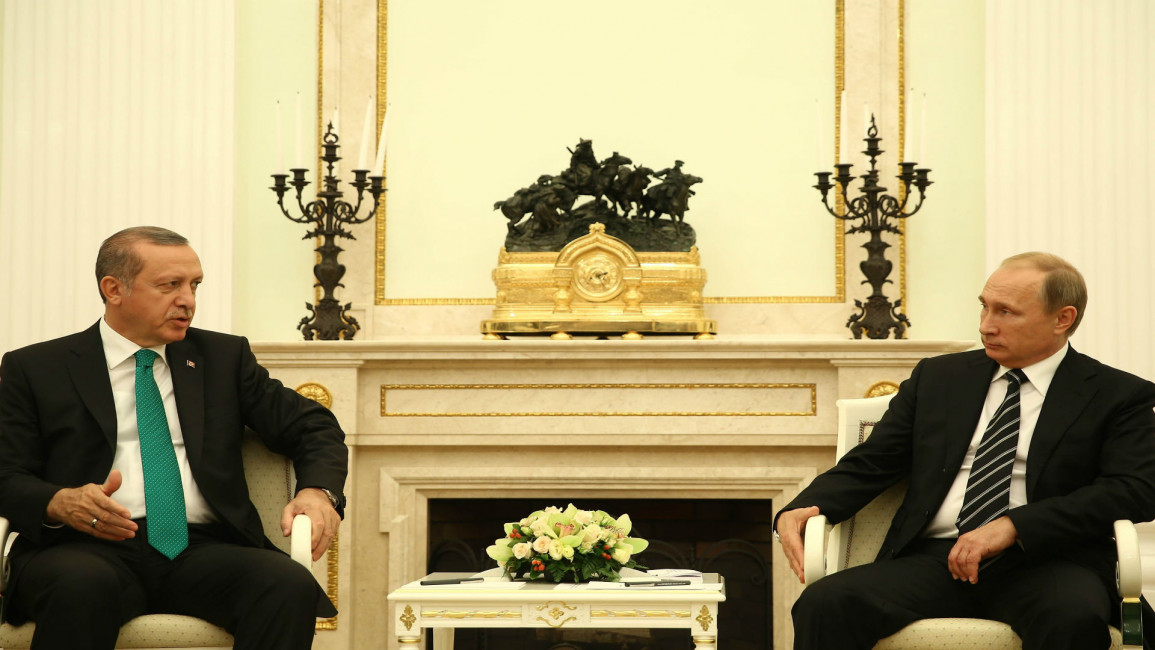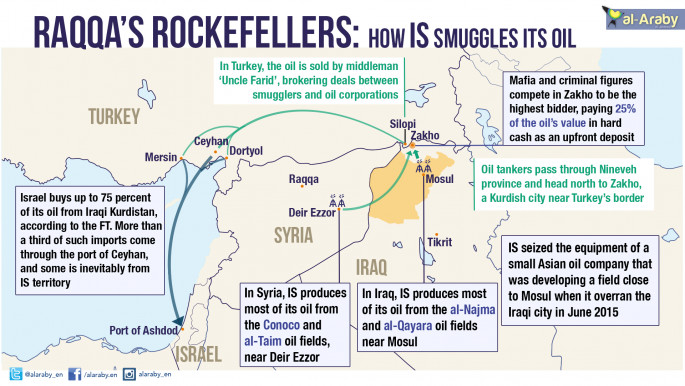War of words erupts between Putin and Erdogan
A war of words between Russian and Turkish Presidents Vladimir Putin and Recep Tayyip Erdogan escalated on Monday as both leaders attended the United Nations climate talks held in Paris.
The Russian president accused Turkey of downing its Su-24 fighter jet on the Turkish border with Syria last week in order to protect oil supplies coming from the Islamic State group (IS) in Syria.
"At the moment we have received additional information confirming that that oil from the deposits controlled by Islamic State militants enters Turkish territory on an industrial scale," said Putin on the sidelines of the climate change talks.
"We have every reason to believe that the decision to down our plane was guided by a desire to ensure the security of this oil's delivery routes to ports where they are shipped in tankers," Putin added.
Al-Araby al-Jadeed revealed last week how oil from IS-controlled areas was smuggled by Mafia-like gangs into Turkey, where it is sold on through criminal middlemen to international oil traders.
| Read more: Raqqa's Rockefellers - How Islamic State oil flows to Israel |
Putin had refused to meet with Erdogan on the fringe of the Paris climate talks to discuss any solution to the escalating tensions between their two countries.
Turkey's President Erdogan reacted furiously to Putin's accusations, which he described as "slander" that would not stand - and challenged the Russian president to provide proof that Turkey was buying oil from IS.
| Read more on the Russia-Turkey crisis over Syria |
| - NATO calls extraordinary meeting after Turkey downs Russian jet - Russia jet in Turkish airspace 'was not the first' - What was Russia's airforce doing near Turkey's borders anyway? - Who are the Turkmen? - Comment: Showdown on the Syrian border |
Erdogan said he would resign if it was proven that Turkey had bought IS oil and questioned whether Putin would resign if his accusations were proven wrong.
"It is obvious where we legally buy oil and natural gas from," Erdogan added. "Everyone must know that we are not that disreputable to make such a deal with terrorist organisations."
Turkish F-16 warplanes had shot down a Russian Su-24 fighter jet on 24 November, claiming that it had breached Turkish airspace and was repeatedly warned to change course.
Russia denies that its plane was in Turkish airspace and claims the jet was within Syrian airspace, where Russian jets have been carrying out airstrikes since 30 September against rebel groups described by Moscow as "terrorists".
The term "terrorist" is defined by the person using it. Syria's President Bashar al-Assad, strongly supported by Moscow, uses the term to refer to any armed opposition to his continuing rule - whether Western-backed Free Syrian Army rebels, the local al-Qaeda franchise known as the Nusra Front, or the Islamic State group itself.
Russia has been accused of targeting the Western-backed opposition, with its airstrikes leading to the deaths of at least 640 civilians in the past two months, according to the Syrian National Coalition.
Sanctions on Turkish products
Meanwhile, the Russian government on Monday announced restrictions on Turkish fruit and vegetable imports as part of a package of sanctions against Turkey in response to the downing of the Russian warplane.
Russia has previously banned food imports from the European Union and United States over the Ukraine crisis, which has been blamed for fuelling price rises of food on the Russian market.
However, Deputy Prime Minister Arkady Dvorkovich said on Monday that the produce ban could be deferred for "several weeks" to allow Russian firms to find new suppliers and curb price rises, according to state news agency RIA Novosti.
Other measures include limits on the ability of Turkish construction firms to sign new contracts in Russia and restrictions on road transport.
Russian Prime Minister Dmitry Medvedev announced that the sanctions against Turkey - decreed by President Putin on Saturday - could be expanded if necessary.
A Turkish official who wished to remain anonymous told al-Araby al-Jadeed that the Turkish government was evaluating a number of measures to respond to Russian sanctions in kind, including transportation and import restrictions.




